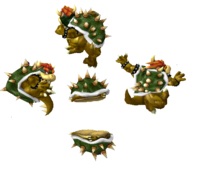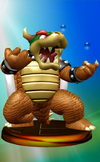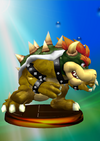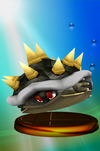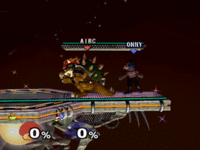Bowser (SSBM)
| Bowser in Super Smash Bros. Melee | |
|---|---|
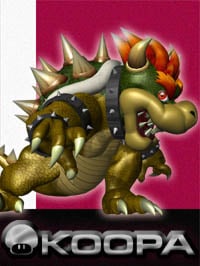 
| |
| Universe | Mario |
| Other playable appearances | in Brawl in SSB4 in Ultimate |
| Availability | Starter |
| Tier | F (26) (North America) H (24) (Europe) |
Bowser (クッパ, Koopa), is a character in Super Smash Bros. Melee and is available from the start. Announced at E3 2001, Bowser was added to the game because he won the official poll of desired newcomers for a potential second Smash game with 169 votes, by a wide margin over the runner-up, Princess Peach.[1] A stronger form of Bowser, named Giga Bowser, also appears as the true final boss of Adventure Mode.
Bowser has no voice actor, but uses realistic roars, similarly to his sounds in Mario Kart 64.
Bowser is currently ranked dead last on the current Melee tier list, being placed 26th out of 26 characters, making this his worst placement in the series. Among Bowser's positive traits is his difficulty in getting KO'd due to his high weight and rather fast falling speed for a heavyweight; additionally, he has among the most powerful attacks in the game (most notably his forward smash), as well as some useful aerial attacks, most notably his forward and upward aerials. However, he suffers due to his large size and falling speed, which makes him extremely easy to combo. His moves are burdened with sluggish frame data, and his approach is among the worst in the game, with laggy aerials, a poor jumping ability (leading to an awful SHFFL), a short wavedash, poor projectile, and a slow, predictable recovery. Bowser suffers from having terrible matchups in the game, with most of the cast being able enough to camp, edgeguard, and overwhelm him with attacks easily.
Attributes[edit]
Bowser acts as the game's primary "slow and powerful" fighter; other equally heavy and powerful characters, such as Donkey Kong and Ganondorf, are of considerably higher speed than Bowser in a variety of ways. Bowser has an average dashing speed, average falling speed, below average air speed, below average traction and the slowest initial dash. These characteristics, however, also give Bowser a short and slow wavedash.
Bowser's greatest strength is his raw damage output and KO potential. Many of his attacks are the strongest of their kind, and their damage output can reach perhaps ludicrous levels; his uncharged forward smash, for instance, deals 24%, and his down tilt has the second highest damage output in the game for a tilt (behind Ganondorf's up tilt), dealing a potential 22% if both hits connect. As a result of this high damage output, Bowser possesses numerous finishing options, with all of his tilts, smash attacks, forward, back, and up aerials, Koopa Klaw back throw, Whirling Fortress, and Bowser Bomb becoming potentials for garnering KOs. In addition to their high power, Bowser's attacks also have very large hitboxes, granting a more threatening offensive presence.
In addition to this, Bowser has a surprisingly high amount of tricks that can be used to aggravate opponents, such as the set knockback on his down throw setting up tech chases against fast fallers. One of Bowser's most versatile moves takes form as his up special move, Whirling Fortress. In addition to its superb damage potential, it is among the most flexible moves in the game, acting as a combo breaker due to its extremely quick five start-up frames, allowing it to serve as a very strong out of shield option, and a dangerous substitute to Bowser's poor defensive roll. Bowser is also surprisingly proficient at edgeguarding, despite his sluggish movement. He can quickly grab the ledge while using his Whirling Fortress off the side of the stage (known as Fortress Hogging), and can push recovering enemies backwards with his below-100% ledge attack, which is one of the best ledge attacks in the game due to its speed and the large area around the ledge that it covers. Meanwhile, his forward aerial is one of his fastest and highest reaching attacks, while his back aerial is a semi-spike, giving him two more useful tools to gimp opponents.
Bowser's extreme power that sacrifices speed, however, is what causes him to be considered the worst character in Melee. Despite an average dashing speed, he has poor air speed, the slowest walking speed, the slowest jump in the game (an 8-frame jump squat) and a mediocre wavedash. Fire Breath is also tied with Zelda's Din's Fire for possibly the worst projectile in the game; with high startup and ending lag, short reach for a projectile, and gradual loss of power, it is almost completely useless outside of edgeguarding already linear recoveries (on top of Bowser already having much better edgeguarding options). His aerial approach is of equally poor quality, due to his aforementioned slow jumping speed and high-lag aerials. This leads to a horrible SHFFL that is, ironically, very easy to perform. These deficiencies give Bowser the worst neutral game of the entire cast.
Bowser's poor neutral game is exacerbated by poor defensive options; his only good option is the aforementioned Whirling Fortress, as all of his other defensive options are among the worst in the game. With a small shield that invites shield stabbing, as well as slow defensive rolls and sidesteps, Bowser has very few ways to escape pressure inflicted onto him. He also has no options against projectiles, due to his massive hurtbox and lack of an effective projectile or reflector of his own. Bowser’s attacks, despite having large hitboxes, also tend to have surprisingly short range (especially for a character of his size) or poor hitbox placement, particularly for his strongest attacks such as his smashes. Finally, Bowser's attacks have notoriously sluggish frame data, and are easy to punish. As a result, Bowser ironically has trouble KOing opponents despite his incredible power, as his poor approaching options and the extreme lag in his moves make him prediction-reliant to land his finishers.
While Bowser does have high endurance potential due to being the heaviest character in the game, it is offset by his terrible mobility and extreme susceptibility to getting comboed, allowing him to be put into KO percentages very quickly. Faster characters, including Fox, Falco, and most of the Melee cast can easily combo, juggle, and chain grab him, with very little chance for Bowser to escape. His slow, predictable, and easily gimpable recovery also hampers his survivability; despite Whirling Fortress being a good out of shield move, it is very poor as a recovery move, granting decent horizontal but terrible vertical distance. This makes meteor smashes and spikes extremely threatening to Bowser, as characters with reliable spikes (such as Falco and Marth) can instantly gimp his recovery, even at extremely low percentages. Bowser's recovery is further hampered by his poor air speed and his lack of alternate options to recover or ways to slow down his falling speed; as a result, Bowser is very simple to edgeguard.
Bowser's lack of low-knockback moves, coupled with high ending lag, give him a very shallow combo game; most of his combos require precise timing and L-cancelling, and even then, these combos are limited to two or three hits even if the opponent DIs poorly, with the last hit often not being one that can lead to a KO. Bowser's slow speed on both the ground and in the air also prevent him from easily pursuing foes after they have been knocked back, leading to opponents easily recovering from hits and being able to counter Bowser's further attempts at comboing. This makes Bowser's punishes highly inconsistent, even at the lowest levels of play.
Overall, Bowser is a very deficient character with few advantages and several crippling weaknesses. His great power is masked by his horrible neutral game, and his survivability is greatly offset by his poor defensive game and ease of being comboed. He also lacks safe moves, with Whirling Fortress often being the only reliable move in his entire arsenal, making him very limiting on players. As such, he rarely sees representation in all levels of play, due to the multitude of hard reads that Bowser players must land to even hold equal footing with other characters in the cast.
Version history[edit]
Bowser was slightly buffed in the PAL version of Melee. The issue regarding his down throw was fixed, and he is slightly heavier.
NTSC 1.02
 Bowser can no longer perform Flame canceling.
Bowser can no longer perform Flame canceling.
PAL
 Bowser is one unit heavier (117 → 118).
Bowser is one unit heavier (117 → 118). Down throw is no longer weight dependent.
Down throw is no longer weight dependent.
 As a result, it now properly hits Jigglypuff and Mr. Game & Watch.
As a result, it now properly hits Jigglypuff and Mr. Game & Watch.
Moveset[edit]
For a gallery of Bowser's hitboxes, see here.
| Name | Damage | Description | ||
|---|---|---|---|---|
| Neutral attack | Left Scratch (左ひっかき) / Right Scratch (右ひっかき) | 5% | Bowser slashes with his left claw, and then his right claw. Resembles a swiping action he performs in Super Mario 64. Noticeable KO potential at higher percentages, being the third most powerful jab in the game. | |
| 6% | ||||
| Forward tilt | ↗ | Koopa Knuckle (クッパ裏拳, Koopa Back Fist) | 13% (fist), 15% (arm) | Bowser leans forward and throws a backhanded punch. Has a bit of start up lag and little range, but it has fairly good knockback for a tilt. In fact, it is the most powerful forward tilt in Melee. Can be aimed up or down. The attack is based on the second hit of his Drill Claw attack in Super Mario RPG: Legend of the Seven Stars. |
| → | 12% (fist), 13% (arm), 14% (body) | |||
| ↘ | 11% (fist), 13% (arm) | |||
| Up tilt | Ceiling Scratch Floor (天井ひっかき, Ceiling Scratch) | 13% | Swats the air above him with his left claw. Has good knockback and can be good for setting up combos. It is the second strongest up tilt in Melee, surpassed by Ganondorf's. | |
| Down tilt | Scratch (よせあつめひっかき, Mish-Mash Scratch) | 13% (hit 1), 10% (hit 2) | Bowser slashes along the ground with his claws. Oddly, despite having two separate hits, they cannot link together past very low percentages and the first hit is stronger. The first hit is one of the stronger down tilts in the game and can KO at higher percentages. | |
| Dash attack | Horn Charge (コンボイタックル, Convoy Tackle) | 11% (clean), 8% (late) | Bowser charges forward. Decent knockback at low percents, but cannot KO at very high percents and is very punishable due to startup and ending lag. | |
| Forward smash | Hammer Head (ブルヘッド, Bull Head) | 24% | Bowser rears back for a short moment and headbutts with force. It deals incredibly high damage and knockback, though suffers from a lot of lag in general. It is the strongest smash attack in the game and KOs at around 18-38% when fully charged. | |
| Up smash | Shell Shock (ライジングスパイク, Rising Spike) | 20% (leap), 12% (landing) | Bowser thrusts his shell upward from a jump and hits the opponent with the spikes. A powerful attack with a rather long-lasting hitbox. Bowser has a smaller hitbox inside his shell that does 17% damage, but it rarely connects due to overlapping the bigger hitbox. Bowser's himself is intangible the moment he jumps off the ground. | |
| Down smash | Buzzsaw (バズソー) | 2% (hits 1-6), 10% (hit 7) | Bowser spins around in his shell, doing great damage with multiple hits from his spikes. Subpar range, can be DI'd out of, and has noticeable ending lag, but still powerful nonetheless. Combos into itself on fast-falling characters. Sixth most powerful down smash in the game. | |
| Neutral aerial | Gyroscope (ジャイロスコープ) | 13% | Bowser spins around in his shell, similarly to down smash. Low knockback, but long duration. | |
| Forward aerial | Jump Slash (ジャンプひっかき, Jump Scratch) | 14% (left claw), 12% (left arm), 11% (right shoulder) | Bowser slashes forward in midair. It has good knockback and good damage output throughout, which makes it a rather viable edgeguarding and KOing option. | |
| Back aerial | Spike Stretch (スパイクボンバー, Spike Bomber) | 13% (clean), 9% (late) | Bowser thrusts his shell backwards. It is a viable edgeguarding option due to being a semi-spike. Has sex kick properties. | |
| Up aerial | Horn Toss (ヘディング, Heading) | 17% | Bowser whips his head above him horizontally. It is the slowest up aerial in the game, but is also the strongest. This is Bowser's only aerial that can KO reliably at 100%, and even earlier on lighter characters. | |
| Down aerial | Scrub Brush (スクラブブラシ) | 3% (hits 1-9), 2% (landing) | Bowser retreats into his shell and spins while facing upside-down. Does a lot of damage if all hits connect, but has low knockback, the hits don't reliably connect, and can lead to a self-destruct if used offstage due to its long duration and Bowser's weak recovery. It has a landing hitbox. | |
| Grab | Grab (つかみ) | — | ||
| Pummel | Bull Horns (つかみヘッドバット, Grab Headbutt) | 3% | Headbutts the foe. Moderately slow. | |
| Forward throw | Catapult (スリングショット, Slingshot) | 10% | Bowser throws his foe forward. Can act as a potential KO move at high percentages. | |
| Back throw | Reverse Throw (バックスルー, Back Throw) | 10% | Bowser throws his foe backwards. | |
| Up throw | Blender (フレッシュミキサー, Fresh Mixer) | 1% (hits 1-8), 2% (throw) | Bowser throws his foe upward a short distance and on his shell, doing damage to the opponent while spinning. Has set knockback and can chaingrab fastfallers. | |
| Down throw | Bowser Slam (ヘビープレス, Heavy Press) | 12% (hit), 0% (throw) | Bowser throws his foe on the ground and splashes them. It has a hitbox which lasts for one frame and deals a rather high 12%. The throw itself deals no damage. Can set up a tech-chase. In NTSC versions of the game, the throw is weight dependent. This makes the throw not deal any damage against Jigglypuff or Mr. Game & Watch, because they are a certain weight, where the down throw animation plays at a speed where it skips the frame the hitbox comes out on (frame 47). In the PAL version, the throw was made weight independent, so it plays at the same speed, and works properly against the entire cast. | |
| Forward roll Back roll Spot dodge Air dodge |
— | — | ||
| Techs | — | — | ||
| Floor attack (front) Floor getups (front) |
6% | Bowser leaps forward to strike with his head, then back to kick behind, and finally gets up into standing position. | ||
| Floor attack (back) Floor getups (back) |
12% | Bowser gets up while swinging his right hand around. | ||
| Edge attack (fast) Edge getups (fast) |
8% | Quickly spins onto the stage, then retreats back a bit. | ||
| Edge attack (slow) Edge getups (slow) |
10% | Slowly climbs onto stage and does a quick claw swipe. | ||
| Neutral special | Fire Breath | 2% | Bowser lets out a stream of fire that weakens over time. The move has a lot of start up lag, and is really only useful for edgeguarding. However, it can be cancelled by using a technique called Flame Cancel. This attack has transcendent priority. | |
| Side special | Koopa Klaw | 12%/10% (slash), 4% (bite capture), 3% (bite pummel), 5% (release), 15% (forward throw), 4% (forward throw collateral), 11% (back throw) | Bowser does a claw swipe. It grabs enemies that are close, while it hits and launches opponents that are farther away. Foes can escape this move in the same way they can escape grabs: by rolling the control stick. The forward throw awards more damage, while the back throw has higher knockback. The attack hitbox has transcendent priority. | |
| Up special | Whirling Fortress | Ground: 13% (clean), 5% (mid), 3% (late) Air: 10% (startup), 3% (loop early), 2% (loop late) |
Bowser retreats into his shell and spins. A recovery move with very little start up. The attack has great knockback when used on the ground, and in the air, it is good for racking up damage. The attack hits once on the ground, but multiple times in the air. It's great for horizontal recovery, but does not cover much vertical distance. Can be used to grab the ledge quickly when grounded facing either direction. | |
| Down special | Bowser Bomb | 21% (drop), 8% (landing) | If used on the ground, Bowser jumps up into the air, then plummets back down to the ground, damaging anyone who's in the way. If used in the air, the move functions the same, except there is no initial jump. The shockwave on the ground can damage nearby opponents. This move is a stall then fall move. | |
Stats[edit]
NTSC
| Stats | Weight | Dash speed | Walk speed | Traction | Air friction | Air speed | Air acceleration | Gravity | Falling speed | Jumpsquat | Jump Height | Double jump Height |
|---|---|---|---|---|---|---|---|---|---|---|---|---|
| Value | 117 | 1 – Initial dash 1.5 – Run |
0.65 | 0.06 | 0.01 | 0.8 | 0.02 – Base 0.03 – Additional |
0.13 | 1.9 – Base 2.4 – Fast-fall |
8 | 31.57 - Base 10.66 - Short hop |
28.77 |
PAL
| Stats | Weight | Dash speed | Walk speed | Traction | Air friction | Air speed | Air acceleration | Gravity | Falling speed | Jumpsquat | Jump Height | Double jump Height |
|---|---|---|---|---|---|---|---|---|---|---|---|---|
| Value | 118 | 1 – Initial dash 1.5 – Run |
0.65 | 0.06 | 0.01 | 0.8 | 0.02 – Base 0.03 – Additional |
0.13 | 1.9 – Base 2.4 – Fast-fall |
8 | 31.57 - Base 10.66 - Short hop |
28.77 |
Announcer call[edit]
English
Japanese
Taunt[edit]
- Rears his head back and roars.
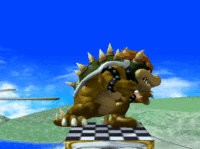
|
Idle pose[edit]
- Similar to his taunt, only slower. Leans back and roars, exhaling steam from his mouth.
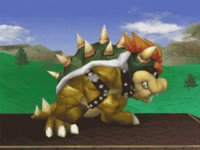
|
|---|
Crowd cheer[edit]
| English | Japanese | |
|---|---|---|
| Cheer | ||
| Description | Bow-ser! Bow-ser! | Kooo-pa! |
| Pitch | Male | Male |
Victory poses[edit]
- Steps forward, builds up a little, and roars.
- Takes two steps forward while swiping with his claws twice.
- Spins around in his shell and comes out smiling.
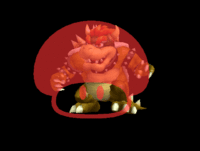 |
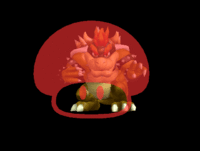 |
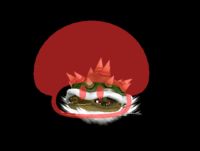
|
|---|
In competitive play[edit]
Most historically significant players[edit]
- See also: Category:Bowser players (SSBM)
62-bit Hero - The most famous Bowser player of the MLG era, and primary innovator of the character. Returned to the community through Netplay upon the release of Project Slippi, but has yet to compete on a large scale again.
Arash - Considered to be one of the best Bowser players in Melee’s early metagame. Placed 9th at MLG San Francisco 2005 and 13th at MOAST 3, the latter being possibly the highest Bowser placement seen at any major tournament in Melee, though it's unclear how much he actually used Bowser at those tournaments, as he played Jigglypuff as well. He eventually switched to solo-maining Jigglypuff before retiring in 2007.
DJ Nintendo - Was considered the best Bowser in the world and one of the best Bowser players of all time. Placed 13th at MLG Long Island 2007 with solely Bowser and used him as a secondary in his placements of 13th at Apex 2009 and 17th at Revival of Melee 2. His win over Ryan Ford is considered the best win the character has seen in the game's competitive life. However, he mostly played other characters, primarily Fox, after the end of the MLG era.
WarriorKnight - One of the primary innovators of Bowser’s metagame and one of the best Bowser players of all time. He placed top 24 at a few superregionals such as 9th at MLG Long Island 2007 and 17th at Zenith 2014. His placements of 49th at both CEO 2016 and Apex 2022 mark the best Bowser placements at majors behind Arash, with the latter being one of the few Bowser results seen at a legitimate tournament in the post-Slippi era.
Tier placement and history[edit]
Since the beginning of the metagame, Bowser has always been a bottom-tiered character, ranking at or near the bottom on many revisions, due to his shallow combo tree, severe vulnerability to getting comboed and edgeguarded, atrocious mobility, and his pitiful matchups against top/high tier characters, which has led to very poor tournament results overall. Even with the innovations of dedicated Bowser professionals such as 62-bit Hero and WarriorKnight, who propelled Bowser to a level of play that many rarely ever saw before, Bowser players simply could not reach the ubiquity and consistency needed as a main to be considered as a relevant threat in the top-level environment. Currently, Bowser is last on the tier list and is ranked in the F tier in 26th place. He has negligible representation in tournaments outside of situational matches where he is counterpicked against players unfamiliar with the matchup (e.g. DJ Nintendo vs. Unknown522 at Zenith 2013) and is considered non-viable for high-level play.
In 1-P Mode[edit]
In Classic Mode[edit]
In Classic Mode, Bowser can appear as an ordinary opponent, an opponent alongside Mario, Zelda, Mewtwo or Peach, a giant opponent, a metal opponent, or an ally in the team and giant battles.
In his appearances, he will appear on either Battlefield or Princess Peach's Castle. Unusually, if fought as a giant character, he will appear on Fountain of Dreams.
In Adventure Mode[edit]
In Adventure Mode, Bowser acts as a final boss of sorts, fought on the last stage, Stage 12: Final Destination. In this appearance, he is larger than usual, and as a result, he is more resistant to knockback. When played on Very Easy and Easy difficulties, or if the player spent too much time in the Adventure Mode, then the game is concluded there. Classic Bowser's trophy falls off the stage, and the player's selected character celebrates with one of their Victory poses.
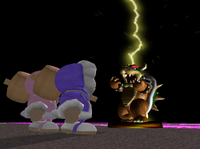
If the player, however, arrives at Stage 12: Final Destination on Normal difficulty or higher, Bowser will appear with his black color scheme instead of his ordinary green color scheme (or his green color scheme if the player plays Bowser with his black color scheme). After he is KO'd and the ordinary cutscene is played, however, the eerie music continues where another cutscene shows the classic Bowser's trophy returning to Final Destination to face the player's character one last time. The trophy is then struck with lightning, and Bowser turns into Giga Bowser. Then Giga Bowser comes to life when he opens his mouth. As a last challenge for the player, they must defeat Giga Bowser in order to clear the Adventure Mode. After he is defeated, a cutscene shows Bowser's trophy falling off the stage again; this time, however, it breaks apart in which appears to be a "floor" in a pitch black background.
In All-Star Mode[edit]
In All-Star Mode, Bowser and his allies are fought on Yoshi's Island, as the remaining Mario stages were already taken by the rest of the four characters in the cast. When fighting Bowser on Yoshi's Island, the stage will always play its alternate track, "Super Mario Bros. 3".
In Event Matches[edit]
Bowser makes the following appearances in the following event matches:
- Event 1: Trouble King: Bowser is the first opponent of the event mode. The player plays as Mario, and Mario and Bowser have 2 stock each in an untimed match on the Battlefield stage. KO Bowser twice to win, which is an easy objective because Bowser is lighter than usual and has less competent AI.
- Event 10: All-Star Match 1: Bowser is the last of five opponents the player must fight in this series of staged battles. The player's character battles him on the Rainbow Cruise stage, and their character has 2 stock while Bowser has 1. With a timer of four minutes, the player must defeat him and the other four characters one-by-one with the overall time and life the player has: Mario, Donkey Kong, Yoshi, and Peach beforehand.
- Event 17: Bounty Hunters: In this original scenario, the player plays as Samus teamed up with Captain Falcon (with Friendly Fire turned off), and the shared opponent is Bowser on the Jungle Japes stage. With everyone receiving one stock and 2:00 as the time limit, the goal is to be the one to KO Bowser. The player fails if Captain Falcon delivers the finishing blow or if Bowser SDs.
- Event 19: Peach's Peril: A scenario designed in homage to the standard plot of traditional Super Mario games of Bowser being after Peach and Mario saving her. The player plays as Mario teamed with Peach, whose AI is set on walking to each end of the stage aimlessly, and they each have 1 stock while the enemy Bowser has infinite stock. Bowser is especially strong and durable in this match, and he will attack either of them in the area on the Final Destination stage. The objective is to last a full minute with both Mario and Peach surviving by the end, and high score is determined by how many times Mario can KO Bowser.
- Event 25: Gargantuans: A scenario designed in homage to old, campy monster movies like Godzilla and King Kong. On the Fourside stage, with unlimited time, the player plays as a giant-sized Bowser (as "Godzilla") with 1 stock against a giant-sized Donkey Kong (as "King Kong") with two stock. Two other characters on the match are a tiny Mario and a tiny Peach, who will be K.O.'d within seconds of the battle between the two main monsters.
- Event 42: Trouble King 2: This tough event takes place in Poké Floats. The player controls Luigi against a giant Bowser in an untimed match where the two of them have a stock of two each.
- Event 51: The Showdown: In the game's final Event Match, the player has to square off against Giga Bowser, Ganondorf, and Mewtwo on a team. With no time limit, the player is tasked with defeat all three, and everyone is given three stocks.
Congratulations Screens[edit]
Trophies[edit]
In addition to the normal trophy about Bowser as a character, there are two trophies about him as a fighter, unlocked by completing the Adventure and All-Star Modes respectively with Bowser on any difficulty:
- Bowser
- Bowser has a long history of kidnapping Princess Peach to lure his nemesis, Mario, into traps. He leads an enormous group of mischievous creatures, not the least of which are his seven children. With outrageous strength, flammable breath, and more spikes than you can shake a Star Rod at, Bowser is a constant threat.
- Super Mario Bros. (10/85)
- Bowser [Smash]
- In many ways, Bowser is the toughest character around. Not only does he have near-impervious hide, but his great mass makes him almost impossible to hurl offscreen. Of course, his weight also makes him rather slow to maneuver, so when facing him in battle, it's best to press your attack and not give him a chance to counter.
- B: Fire Breath
- Smash B: Koopa Klaw
- Bowser [Smash]
- Bowser's Fire Breath strikes continually, but it grows gradually smaller over time until it's barely smoldering. The Koopa Klaw rakes enemies at a distance and pulls nearby foes in close for a good gnawing. Bowser's Whirling Fortress moves laterally over the ground; it works in midair as a recovery. The Bowser Bomb is powerful and paves the way for more attacks.
- Up & B: Whirling Fortress
- Down & B: Bowser Bomb
Alternate costumes[edit]
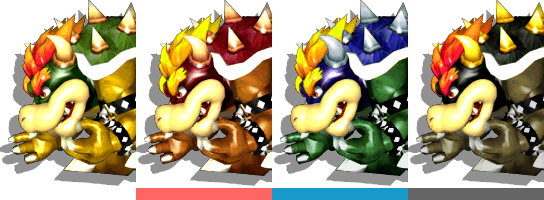
| |||
Glitch[edit]
Bowser's giant hand glitch is a glitch in Super Smash Bros. Melee that temporarily makes Bowser's hand inflate to several times its size, as the name implies. However, the glitch is only visible for a brief second.
Method: First, Bowser must pick up a capsule, then short hop. This also works with any item you can throw with the A button. After that, he must immediately perform an air dodge.
- As Bowser lands from the air dodge, his right hand (the one holding the capsule) will quickly grow many times its normal size, then just as quickly shrink back to normal. It grows and shrinks over the space of only a few frames, so it is difficult to pause the game at exactly the right point. If the game is paused when Bowser's hand is giant, inspection reveals that the giant hand is as detailed as Bowser's normal hand. When in its giant state, the hand can also distort platforms.
Gallery[edit]
Taunting while holding a Mr. Saturn on Princess Peach's Castle.
Using Whirling Fortress on Fountain of Dreams.
Using his down throw on Kirby on Princess Peach's Castle.
Using Bowser Bomb on Fox on Pokémon Stadium.
Using Koopa Klaw on Fox on Great Bay.
Using Fire Breath on Brinstar.
Knocked back by Captain Falcon's Falcon Kick on Corneria.
Trivia[edit]
- In the Special Movie, Bowser is the only character not to appear with his universe (nor play a song from his own universe nor play his own credits theme). However, Bowser is from the Mario universe. But he is shown right after Captain Falcon (continuing Captain Falcon's theme song and credits theme).
- Bowser has his own unique landing effect as opposed to the other characters. This effect is also used for his helpless landing animation as well.
- Not counting Donkey Kong and Mario, as they have been both a protagonist and antagonist, Bowser, along with Ganondorf, are the first two playable antagonists in the Smash franchise.
References[edit]
External links[edit]
| Fighters in Super Smash Bros. Melee | |
|---|---|
| Veterans | Captain Falcon · Donkey Kong · Fox · Jigglypuff · Kirby · Link · Luigi · Mario · Ness · Pikachu · Samus · Yoshi |
| Newcomers | Bowser · Dr. Mario · Falco · Ganondorf · Ice Climbers · Marth · Mewtwo · Mr. Game & Watch · Peach · Pichu · Roy · Young Link · Zelda (Sheik) |
